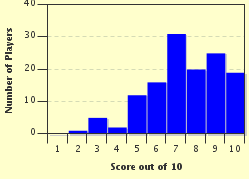Quiz Answer Key and Fun Facts
1. Do you know the difference between 'less' and 'fewer'? Which choice is correct?
2. Let's talk 'literally vs 'figuratively'; which sentence is NOT correct?
3. Which of the following words is not a real word?
4. Let's not embarrass ourselves...which word means 'having lost bladder and/or bowel functions'?
5. Another word combination that seems to confuse many people is 'affect' and 'effect', so which sentence is WRONG?
6. Which of the following phrases was once thought to be a paradox?
7. How about the words 'then' and 'than'? Which sentence is correct?
8. The next round is 'since' vs 'because'; which of the following sentences creates an ambiguity?
9. And then there's stationary and stationery; which is the correct definition?
10. Which of the following words would you use to indicate a possessive noun or a contraction?
Source: Author
nyirene330
This quiz was reviewed by FunTrivia editor
looney_tunes before going online.
Any errors found in FunTrivia content are routinely corrected through our feedback system.


